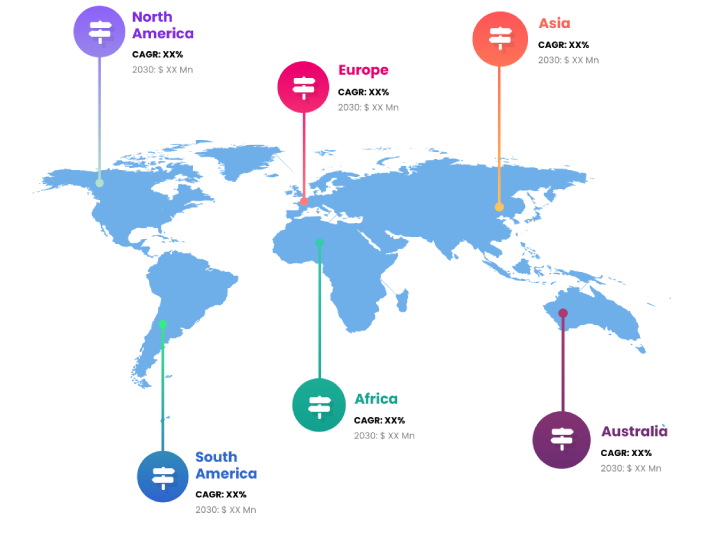Products made for sensitive skin are designed to protect and soothe hypersensitive skin. These items aim to reduce the likelihood of sensitive skin experiencing irritation, redness, and pain. They lack potentially irritating components including artificial scents, colours, and chemical preservatives. Products for sensitive skin include cleansers, moisturisers, sunscreens, and even cosmetics. They typically contain anti-inflammatory and pain-relieving substances such aloe vera, chamomile, and oats. These products are suitable for sensitive skin since they have undergone extensive testing to ensure they are hypoallergenic and non-comedogenic. Those with sensitive skin can protect their skin from the harmful effects of conventional skincare products by switching to those designed for more delicate skin.

Revenue growth projections and trends analysis for each submarket of the sensitive skin care products market are included in this study. Key growth factors, opportunities, and challenges affecting the sensitive skin care products market are analysed in this analysis. The competitive landscape has been drawn taking into account the most up-to-date market changes and strategic moves, such as expansion, product launch and development, collaboration, merger, and acquisition. The research provides a detailed analysis of the top market competitors, highlighting their strengths and weaknesses across all subsegments of the sensitive skin care products market.
Influential Elements
The rising incidence of skin sensitivities and allergies among individuals is one of the primary forces propelling the sensitive skin care products market. The rising prevalence of sensitive skin disorders has resulted in a surge in interest in products designed specifically for people with this skin type. The market is expanding due to increasing consumer awareness of the importance of skincare and the availability of numerous sensitive skin care products. Research and development successes that result in novel, high-quality products also contribute to market growth. Social media, beauty bloggers, and celebrity endorsements all play a role in increasing interest in sensitive skin care products. The expansion of the sensitive skin care products market can be attributed to the increasing number of people all over the world, especially in developing countries.
Limiting Circumstances
There are a number of factors that could slow the expansion of the sensitive skin care products market. For example, the higher price of specialised formulations and ingredients could prevent certain consumers from being able to afford them. Confusion among customers brought on by a lack of strong rules and standardised terminology for sensitive skin can hamper their decision-making. In addition, consumers may lose faith in a brand if it has a bad reputation for selling fake or low-quality goods. The market for sensitive skin care products may also face challenges from other types of skincare options, such as natural cures or do-it-yourself creations. Overall, restricted access to certain markets, such as those in rural areas or developing nations, might slow the growth of the market as a whole.
Face care, body care, and lip care are the three main submarkets of the sensitive skin care products sector of the global market. Due to the fact that the face is the most exposed area of skin and is thus more vulnerable to environmental variables and irritants, the face care segment has a disproportionately large share of the sensitive skin care products market. Therefore, particular care for the face is generally a top priority for those with sensitive skin. Products including cleansers, moisturisers, serums, masks, and sunscreens are all included in the face care category, all of which are formulated with delicate skin in mind. These solutions are specially developed with calming ingredients to give targeted treatment for facial skin while reducing the likelihood of discomfort. Individuals with sensitive skin are also concerned about premature ageing and the appearance of fine lines and wrinkles, driving demand for anti-aging therapies in the face care market. As a result of catering specifically to the requirements and worries of those with sensitive facial skin, the face care subsegment of the sensitive skin care products market is the most lucrative.
The global market for sensitive skin care products can be broken down into the submarkets of grocery shops, discount stores, drug stores, online retailers, and others. The sensitive skin care products industry is dominated by supermarkets and hypermarkets for numerous reasons. These stores provide customers with a large variety of products in one convenient location. Customers may quickly and simply compare numerous brands and variants of a product to get the best option for their needs. With so much storage space, big-box stores and supermarkets may carry a wide variety of sensitive skin care products from different manufacturers. Customers flock to take advantage of the convenience and selection. These stores also frequently have sales and discounts, which makes sensitive skin care items more cheap. Supermarkets and hypermarkets have a large customer base and an extensive distribution network, which benefits manufacturers and suppliers. Therefore, the sensitive skin care products market is dominated by the supermarkets and hypermarkets subsegment due to the former's convenience, product choice, and pervasive presence.
Report Coverage
Global Sensitive Skin Care Products research report categorizes the market for global based on various segments and regions, forecasts revenue growth, and analyzes trends in each submarket. Global Sensitive Skin Care Products report analyses the key growth drivers, opportunities, and challenges influencing the global market. Recent market developments and Sensitive Skin Care Products competitive strategies such as expansion, product launch and development, partnership, merger, and acquisition have been included to draw the competitive landscape in the market. The report strategically identifies and profiles the key Sensitive Skin Care Products market players and analyses their core competencies in each global market sub-segments.
| REPORT ATTRIBUTES | DETAILS |
|---|---|
| Study Period | 2017-2030 |
| Base Year | 2022 |
| Forecast Period | 2022-2030 |
| Historical Period | 2017-2021 |
| Unit | Value (USD Billion) |
| Key Companies Profiled | L'Oreal S.A., Unilever PLC, The Estee Lauder Companies Inc., Procter & Gamble Company, Maxingvest AG, Amorepacific Corporation, Pevonia International Inc., Johnson & Johnson Services Inc., Kao Corporation, and Sebapharma GmbH & Co. KG and other key venders. |
| Segments Covered | • By Product |
| Customization Scope | Free report customization (equivalent to up to 3 analyst working days) with purchase. Addition or alteration to country, regional & segment scope |
Key Points Covered in the Report
- Market Revenue of Sensitive Skin Care Products Market from 2021 to 2030.
- Market Forecast for Sensitive Skin Care Products Market from 2021 to 2030.
- Regional Market Share and Revenue from 2021 to 2030.
- Country Market share within region from 2021 to 2030.
- Key Type and Application Revenue and forecast.
- Company Market Share Analysis, Sensitive Skin Care Products competitive scenario, ranking, and detailed company
profiles. - Market driver, restraints, and detailed COVID-19 impact on Sensitive Skin Care Products
Market
Competitive Environment:
The research provides an accurate study of the major organisations and companies operating in the global Sensitive Skin Care Products market, along with a comparative evaluation based on their product portfolios, corporate summaries, geographic reach, business plans, Sensitive Skin Care Products market shares in specific segments, and SWOT analyses. A detailed analysis of the firms' recent news and developments, such as product development, inventions, joint ventures, partnerships, mergers and acquisitions, strategic alliances, and other activities, is also included in the study. This makes it possible to assess the level of market competition as a whole.
List of Major Market Participants
L'Oreal S.A., Unilever PLC, The Estee Lauder Companies Inc., Procter & Gamble Company, Maxingvest AG, Amorepacific Corporation, Pevonia International Inc., Johnson & Johnson Services Inc., Kao Corporation, and Sebapharma GmbH & Co. KG and other key venders.
Primary Target Market
- Market Players of Sensitive Skin Care Products
- Investors
- End-users
- Government Authorities
- Consulting And Research Firm
- Venture capitalists
- Third-party knowledge providers
- Value-Added Resellers (VARs)
Market Segment:
This study forecasts global, regional, and country revenue from 2019 to 2030. INFINITIVE DATA EXPERT has segmented the global Sensitive Skin Care Products market based on the below-mentioned segments:
Global Sensitive Skin Care Products Market, By Product Type
Face Care
Body Care
Lip Care
Global Sensitive Skin Care Products market, By Gender
Male
Female
Global Sensitive Skin Care Products Market, By Distribution Channel
Supermarkets & Hypermarkets
Specialty Stores
Pharmacy & Drugstores
Online
Others
Global Sensitive Skin Care Products market, Regional Analysis
- Europe: Germany, Uk, France, Italy, Spain, Russia, Rest of Europe
- The Asia Pacific: China,Japan,India,South Korea,Australia,Rest of Asia Pacific
- South America: Brazil, Argentina, Rest of South America
- Middle East & Africa: UAE, Saudi Arabia, Qatar, South Africa, Rest of Middle East & Africa
You will get in-depth and extensive sensitive skin care products market market research and competitor analysis for your business to help you develop more profound insights into the sensitive skin care products market Market.
Through INFINITIVE Data Expert is a professional Market Research services, I will identify the sensitive skin care products market market size, demand & opportunities, growth rate, and target audience with a comprehensive analysis of your competitors.



